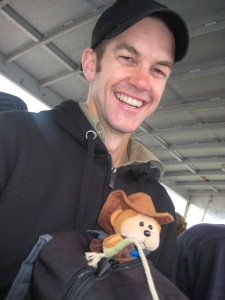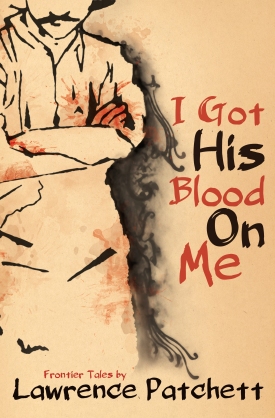When I opened up my fresh new copy of Laurence Fearnley’s latest book, Reach, I did what I do with every new book I get. I looked at the first few pages, read the first few lines, then turned to the acknowledgements section at the back. I don’t know why I always read the acknowledgements first, but I started doing so long before I knew any actual writers myself. At some point during my evolution as a reader, reading the acknowledgements was something I did while I was reading the book, rather than once it was finished. I began to read them earlier and earlier until eventually it became the first thing I did. Maybe it’s the amateur anthropologist in me, but I find myself as interested in the writer of the book and her/his influences as I am in the book itself. So the more extensive the acknowledgements, the more pleasurable the text. I used to do the same thing with LPs (yes, LPs!) and CDs.

Reading Laurence’s acknowledgements, I was surprised to see my name there. What the heck had I contributed to this book? I hadn’t read any drafts, or offered any feedback. But Lorry (Lawrence Patchett, who did read drafts and offer feedback) pointed out that Laurence had acknowledged the ‘conversations’ she’d had with many people, including me. The reason I’m writing about that here is that I’ve been thinking a lot about this tour and how it was born out of friendships we formed during our PhD study. Something indefinable happens in some workshop situations, and here I want to say something about the whole being greater than its various parts. There were indefinable advantages for our writing in the development of our friendships with each other, and maybe it is these that Laurence acknowledges (or maybe not; I haven’t asked her. If I did, she might say, ‘Rubbish. Remember that time you told me about a dog* that got hit by a car? That’s what you contributed to the book’).
When I started studying writing, I was just as interested in finding a community of creative people I could relate to as I was in learning to write. Not all of us are like this. I’ve just always been a bit obsessed with community, and always found it difficult to place myself in any (#2 reason for Acknowledgements obsession). The truth is the writing came first, but if I could come out of my study with a community of like-mindeds, I’d be very happy. And I was. I was twice blessed in that I moved straight from the MA to the PhD, and therefore got to know two groups of writers, the second lasting nearly four years and welcoming new members as time went on.

So this is how Laurence, Pip, Lorry and I know each other: Pip & Lorry were in the same MA workshop and same studio space before the PhD; Laurence was an established writer who didn’t know any of us but was looking for a way to stimulate her writing again through contact with other writers; I didn’t know any of them either but had just finished the MA, had a fairly lofty idea for a novel, and was keen to maintain some connection with the writing environment at the IIML. There were eight or so others in the group too who became really good friends. We all wrote differently, had different ideas, different processes and different histories. But the amount of generosity and support from the other writers was always pretty extraordinary. Sometimes that generosity came in the form of really strong critique. The best kind.
So what did we do? Well, we wrote our books, and analysed our analyses, but every six weeks we got together and read someone’s work and gave them some feedback. That was it. Sometimes it sounds so ridiculously simple it is very difficult to express how helpful this process is, but anyone who has ever done a workshop will know.
Except that wasn’t entirely it.
Last year I attended a conference in which ‘the writers’ workshop’ came under pretty heavy critique. I don’t think the workshop process is perfect, but I was surprised by some of the comments I heard. Obviously, the workshop wasn’t working well for everyone, even in the PhD course I’d just left. What was going on?
‘It’s hard to respond to someone’s work when you don’t really know them or their project that well,’ a friend told me, ‘it’s different to the MA where you see each other every week and form a really strong cohort. We only see each other every six weeks.’
But, I asked, didn’t they spend time together outside of that? Did they ever have coffee and talk in between bouts of intense reading and scribbling or typing away? It became apparent that because many lived out of town or had family commitments, the answer was no, not so much. I thought this was a terrible shame, but I also knew from what I’d heard that day that not everyone would agree with my sudden brilliant hypothesis: that friendship was a crucial factor in the development of a successful workshop environment.
This feels like stating the obvious, but apparently it isn’t, and in teaching a writing workshop at any level, the convener can’t say ‘Hey guys, this’ll work so much better if you become good mates.’ Where’s the empirical evidence? What if you don’t like each other? Can the workshop be successful without the sticky stuff of relationship filling the gaps? Of course it can, but I’ve begun to suspect it won’t be as successful. And how do you facilitate, or talk about, something as amorphous as friendship as a crucial factor in doctoral study?

I don’t want to dwell too much on the academics of it. What happened was: we had lunch once every week or two. I seem to remember Pip was particularly good at rounding us up. Sometimes other writing friends came along. It was a sweet relief from the isolation of office hours (though it also helped that we all shared offices on the same floor). Every six weeks, before our workshop, we had a really big lunch with all the out of towners. Eventually we started going out for a drink after class too. At those lunches, especially early on, I remember a great deal of discussion about our projects as we tried to figure out what everyone was doing. We’d swap seats or start new conversations just to get to know people and their work.
As we got closer, sometime into the second year of study, I began to notice the workshop strengthen. I found myself arguing more intensely for or against particular aspects of a project, because I cared even more than I had before. This was not a professional exchange, but a personal interest in seeing a friend develop the full potential of their project. After someone offered a particularly passionate critique of my own work, I felt pleased rather than bruised. I knew the reviewer was fully invested in my writing and where it might go.
I continue to be surprised by the generosity of the friendships we formed during our years of study. I shouldn’t be. Writers are a pretty friendly bunch (even the awkward ones), and invariably generous (even the grumpy ones). Example: I get to tag along on the Roadwords Tour. I think we’ve all missed each others’ company and talking about the various ways we write. On the tour we’ll get to ask each other questions about our books. It’s funny, but even after so many discussions about writing, there are still many things we don’t know. Like, the subject of Pip’s new novel and her future podcasts, if Lorry finds writing about the future similar to writing about the past, whether Laurence likes climbing mountains or writing about climbing mountains better, and if anyone else has the weird habit of reading the acknowledgements section first…**

*or something else I don’t remember saying.
**may have to stop doing this now that I’ve admitted it.





















